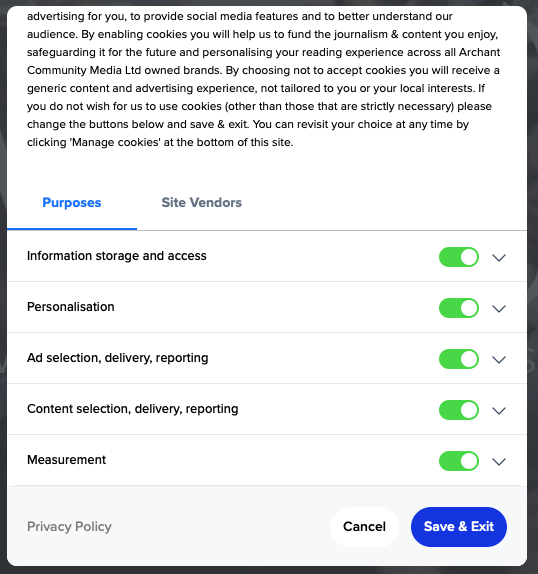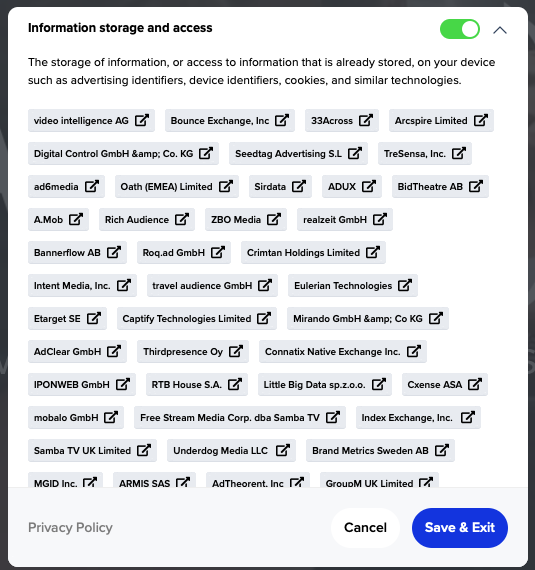The Internet is getting uglier every year. Whether it is the amount of ads on websites, social media feeds and surrounding thumbnails, the cookie pop-ups on every single website with the worst and ugliest offenders being the news media and even government websites, it is getting worse. But you never noticed, because it has been creeping up on use steadily over the years. Just stop and have a mindful look right now at the website you are on. Not this one of course, this one (Medium) hasn’t yet been polluted. Maybe Ev Williams - CEO at Medium has learnt from his days at other tech firms?
Do you know The Cookie Monster?

I never knew him as well as I do now, thanks to HubSpot for making it clearer for me. They shared a blogpost with me, which contained the following key bit of text.
What’s the difference between a first party and a third party cookie?
The difference between first- and third- party cookies is how they’re saved and who can see them. When a website saves a cookie, it’s given a domain. If the domain on the cookie matches the domain of the website setting it, it’s a first party cookie. If the domain is different, it’s a third party cookie. First party cookies can only be seen when on the website that set it, where third party cookies are visible from any website.
This is why most ad tools use third party cookies; they enable a tool to track a user across multiple websites, and they can use that cross-site data from any other website to tailor ads.
One specific example:
Let’s say you’re on a website, a.com. It’s an ecommerce business. You put something in your shopping cart. When you come back later, the site remembers you, and keeps your same items in the shopping card. That’s the result of a first party cookie doing its job. The cookie was set by the same domain you’re on.
On the other hand, let’s say you’re on a.com, and the page you’re on contains an iframe from a different website (b.com). Cookies set by b.com accessed from an a.com page are third-party cookies. Accessing them from a.com is a cross-site request. This iframe might show you an ad via Doubleclick — — they track you across multiple websites, and serve you ads wherever you go online.
Every single time I click on a news story, that someone has shared on social media and I click through to the news website, I am confronted with a massive cookie notice, rendering the news story impossible to read. Of course most of us just agree to the notice, because we’re so hungry for that news story. But you have no idea that they are sharing your cookie with hundreds and maybe even thousands of vendors (that’s what they call them), actually advertisers, names you have never ever heard of all across the globe.
I did a video for you, so you can see for yourself and of course Facebook is complicit too, because they add an extra bit of spice on top of the tracking process with the Facebook Pixel. That way doesn’t matter if you’re active on Facebook or even have an account, they will track you off line as well.
[embed]https://youtu.be/nWUwZ2IXRqM[/embed]
The web has become an ugly and evil marketplace, the desperation of making money off every single visitor to your website has made the surfing experience a total waste of time. The TV once again has become attractive, I’m talking of course about the channels that do not serve ads, but that means we’re still paying aren’t we? Maybe an Internet that needs to be paid for, like your Spotify and Netflix could be a better future?
Happy surfing!
ps. My discussion on LinkedIn below.
[embed]https://www.linkedin.com/posts/stayingaliveuk_thats-it-ive-had-it-im-never-again-clicking-activity-6636525673294905344-Axdk[/embed]
250 Ways to get your Data

Lots of us that are on Twitter get our news from there. There are millions of users posting links to news websites and most of these news websites, these days, are behind a paywall, so we can’t read the article unless we pay!
But there are also 100’s of news websites who do not have a paywall, but they need us to accept their cookie notice. Their cookie notice is SO big, it means that unless you accept it, there’s absolutely no way that you can read the article that you have been lured towards.
So what do you do, just click away? Well you’ve taken the trouble of being enticed to go and read the article, so you might as well click the cookie notice and read the article. But have you ever really investigated what you are giving acceptance too?
After investigating many websites who have this very large cookie notice, obscuring the article, I have discovered that there are around 250 companies, who are after your data.
They introduce their cookie notice with the following wording. I have grabbed this from a media website named archant.co.uk.
We are committed to building local communities through high-quality journalism and content. We and our partners use technology such as cookies to personalise content and advertising for you, to provide social media features and to better understand our audience. By enabling cookies you will help us to fund the journalism & content you enjoy, safeguarding it for the future and personalising your reading experience across all Archant Community Media Ltd owned brands. By choosing not to accept cookies you will receive a generic content and advertising experience, not tailored to you or your local interests. If you do not wish for us to use cookies (other than those that are strictly necessary) please change the buttons below and save & exit. You can revisit your choice at any time by clicking ‘Manage cookies’ at the bottom of this site.
Let’s be clear, this is not just Google or Facebook ads, these are 250 companies across the world, who wish to push ads to you based on your unique IP address. These aren’t just ads on their website, these are ads wherever you go.

In essence The Internet and the media websites and others, have constructed a new tax, that tax is your data and ads. If you wish to consume any content these days, that is the tax you are paying. Regardless of their suggestion that you can manage, what you receive in terms of ads, it’s not that easy to manage it and it takes time, a lot of time, especially seeing as we’re all so time poor and surf the web in split second increments.

I move away now from any website that has this huge cookie notice — I avoid them all the time. Instead I consume my news in other ways, Twitter is great, but definitely avoid clicking through to news websites. The Apple News app is not bad, but even inside there they have loads of ads and now most news channels request a subscription.
I’m afraid this is only going to get worse as media channels are trying to get their revenues up.
The company I researched by the way has a £87 million turnover and employ 1,277 people. See the stats below.
Happy news surfing, but just know what you are saying YES too.